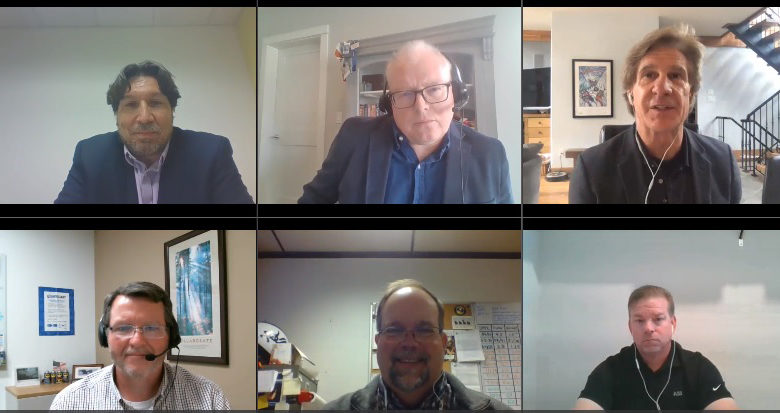SafeStart’s Larry Wilson, along with Teg Matthews, brought together a panel of experts to have a series of real discussions about how COVID-19 is affecting global businesses—on both organizational and personal levels. They talked about how they’re managing a quicker than anticipated return to work, the use of remote worker training (and whether behavior change is possible through distance learning) and how to sustain new habits and practices post-pandemic.
The panel experts include John McGillivray, Mgr., Safety & Environmental Affairs – Scot Forge; Anthony Panepinto, Associate Director HS&E – Procter & Gamble; Ed Stephens, Global Business Support HSE/SA, US, Americas – ABB; Ken Tutin, Vice President Continuous Improvement Crown Americas Division – Crown Cork and Seal; David Bianco, Division SHEQ & IMS Manager at Epiroc Drilling Solutions; and Vivianna Laprea, HSQ Manager – EDP Renewables.
The above-mentioned companies have been operating through the pandemic over the past few months on a wide scale. They had to assemble their response teams, revisit their emergency response plans and set new standards for both the employees that were on the shop floor and the ones that were operating from home. This webinar series is a remarkably candid way to hear firsthand what companies have been doing and their plans for going forward.
While all panelists agreed that communication is the most important element in getting through this tough time, they also recognized it may be harder to control their environment amidst the infodemic of misinformation. As a safety leader, it’s important to ensure that sites are getting the right information to do risk communication.
Demand in business hasn’t dropped off the way a lot of industries expected. A behavior-shift is required to not only endure the immediate impact the pandemic has had but to sustain new habits and practices if a second round ensues. The panelists noted how important it is to recognize the psychological impact that people are going through, not just on the job but outside of work as they’re contemplating what’s going on with their family, and in their community.
Since OSHA still requires organizations to maintain their training requirements, they also discussed what that looks like in the face of the new norm. Things will never go back to the way they were pre-COVID so it’s important to adopt new practices to sustain these habits long-term. One of the key troubles with distance training is COVID-message fatigue. Since the messaging has been so constant, not only are people tired of hearing about them but they are becoming complacent to the risks those conversations are trying to warn against. Behavior training is more important than ever.
This Expert Panel webinar series provides insight from the leading safety professionals from top companies around the world. Not only do they cover all of the above-outlined information but they also touch on some of the positives to come from the pandemic like increased communication, improved hygiene, they’ve learned the importance of storytelling for distance learning, more frequent near-miss reporting and how to create new habits effectively and discuss options for sustainability.
Take some time to hear it from the experts directly by registering and watching each of the recordings found here and sign up for the next round of sessions.

